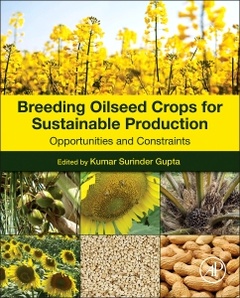Description
Breeding Oilseed Crops for Sustainable Production
Opportunities and Constraints
Coordinator: Gupta Surinder Kumar
Language: English
Subjects for Breeding Oilseed Crops for Sustainable Production:
Keywords
abiotic stress; adaptation; agro-advisory; AICRP; Arabidopsis; biofortification; biotic stress; botanicals; brassicas; breeder seed production; breeding; chlorophyll; coconut; Cocos nucifera L; cooking; crop management; cultural control; cytoplasmic male sterility system; desolventizer; dihaploids; disease resistance; diseases; drought; drought tolerance; dwarf; Elaeis guineensis Jacq; enzymatic treatment; extrusion; fatty acid profile; fatty acids; flaking; flower; foliar and fungal diseases; forecasting; frontline demonstrations; genetic engineering; genetic improvement; genetic resources; genomics; germplasm; Glycine max (L.) Merrill; groundnut; haploid; herbicide resistance; hybrids; hyperaccumulation; ideotype; improvement; insect pests; integrated crop protection; integrated nutrient management; integrated pest management; interacting factors in breeding; interventions; intracellular pathogens; ionomics; land races; metabolic engineering; metabolomics; moisture conservation; molecular aspects; molecular breeding; mutation; native pollinators; niger; oil; oil content; oil crops; oil extraction; oil palms; oil processing; oil quality; oilseeds crops; Olea europaea L; olive productivity; pests; phenomics; phenotypic plasticity; planned pollination; pollination; pollinators; production; proteomics; quality traits; resistance; Rhizobium culture; safflower; seed coat color; seed yield; sesame (Sesamum indicum L.); short duration; single-headed; soy meal; soybean; sunflower; sustainability; sustainable; sustainable production; TILLING; tissue culture
582 p. · 19x23.3 cm · Hardback
Description
/li>Contents
/li>Readership
/li>Comment
/li>
Breeding Oilseed Crops for Sustainable Production: Opportunities and Constraints presents key insights into accelerating the breeding of sustainable and superior varieties.
The book explores the genetic engineering/biotechnology that has played a vital role in transforming economically important traits from distant/wild species to cultivated varieties, enhancing the quality and quantity of oil and seed yield production. Integrated nutrient management, efficient water management, and forecasting models for pests diseases outbreaks and integrated pest and pest management have also added new dimensions in breeding for sustainable production. With the rise in demand, the scientific community has responded positively by directing a greater amount of research towards sustainable production both for edible and industrial uses.
Covering the latest information on various major world oil crops including rapeseed mustard, sunflower, groundnut, sesame, oilpalm, cotton, linseed/flax, castor and olive, this book brings the latest advances together in a single volume for researchers and advanced level students.
1. Strategies for increasing production of oilseeds on sustainable basis
2. Breeding oil crops for sustainable production: heavy metal tolerance
3. Brassicas
4. Sunflower
5. Groundnut
6. Sesame
7. Safflower
8. Niger
9. Coconut
10. Oil palm
11. Olive
12. Soybean
13. OMICS: A new approach for sustainable production
14. Forecasting of diseases and insect-pests for value-added agro-advisory
15. Designer oil crops for sustainable production
16. Genetic improvement of rapeseed-mustard through induced mutations
17. Pollination intervention in oilseed crops
18. Breeding oilseed for climate change
19. Possibilities of sustainable oil processing
20. Integrated pest management
Oilseed breeders, genetic engineers, biologists, pathologists, entomologists and taxonomists as well as scholars and post-graduate students in understanding the crop better and evolving effective strategies for the development of new and superior crop varieties and sustaining oil crop production
- Describes various methods and systems to achieve sustainable production in all major oilseed crops
- Addresses breeding, biology and utilization aspects simultaneously including those species whose information is not available elsewhere
- Includes information on modern biotechnological and molecular techniques and production technologies
- Relevant for international government, industrial and academic programs in research and development




